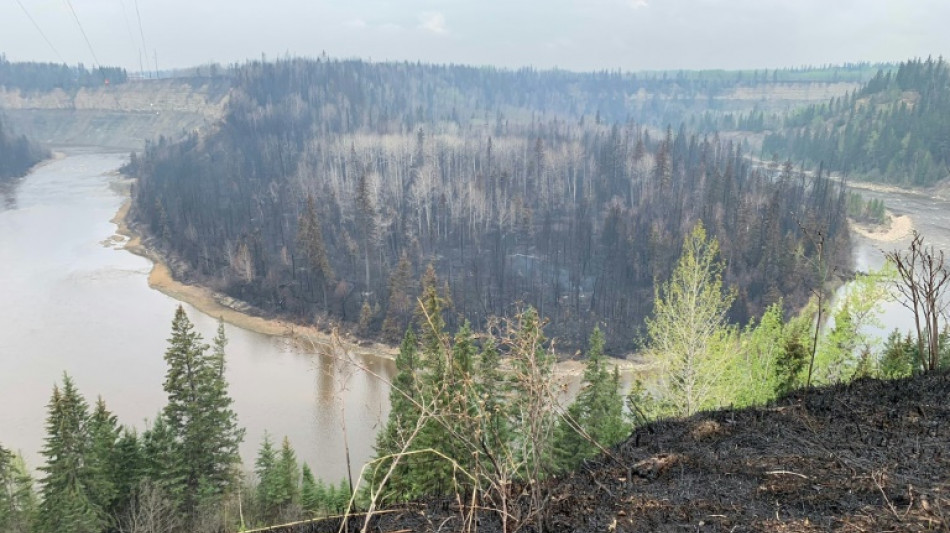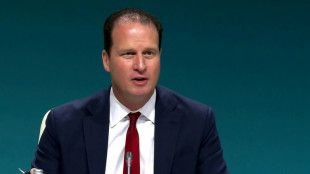
-
 Trump's Republican allies tread lightly on Paris pact at COP29
Trump's Republican allies tread lightly on Paris pact at COP29
-
Graham equals record as nine-try Scotland see off tenacious Portugal

-
 Protesters hold pro-Palestinian march in Rio ahead of G20
Protesters hold pro-Palestinian march in Rio ahead of G20
-
Graham equals record as nine-try Scotland see off dogged Portugal

-
 China's Xi urges APEC unity in face of 'protectionism'
China's Xi urges APEC unity in face of 'protectionism'
-
Japan's Kagiyama, Yoshida sweep gold in Finland GP

-
 Macron to press Milei on climate action, multilateralism in Argentina talks
Macron to press Milei on climate action, multilateralism in Argentina talks
-
Fritz reaches ATP Finals title decider with Sampras mark in sight

-
 All eyes on G20 for breakthrough as COP29 climate talks stall
All eyes on G20 for breakthrough as COP29 climate talks stall
-
Fritz battles past Zverev to reach ATP Finals title decider

-
 Xi, Biden to meet as Trump return looms
Xi, Biden to meet as Trump return looms
-
Kane warns England must protect team culture under new boss

-
 Italy beat Japan to reach BJK Cup semi-finals
Italy beat Japan to reach BJK Cup semi-finals
-
Farmers target PM Starmer in protest against new UK tax rules

-
 Shiffrin masters Levi slalom for 98th World Cup win
Shiffrin masters Levi slalom for 98th World Cup win
-
Italy's Donnarumma thankful for Mbappe absence in France showdown

-
 McIlroy in three-way tie for Dubai lead
McIlroy in three-way tie for Dubai lead
-
Bagnaia wins Barcelona MotoGP sprint to take season to final race

-
 Ukraine's Zelensky says wants to end war by diplomacy next year
Ukraine's Zelensky says wants to end war by diplomacy next year
-
Shiffrin wins Levi slalom for 98th World Cup victory

-
 Israel pummels south Beirut as Lebanon mulls truce plan
Israel pummels south Beirut as Lebanon mulls truce plan
-
Religious Jews comfort hostages' families in Tel Aviv

-
 German Greens' Robert Habeck to lead bruised party into elections
German Greens' Robert Habeck to lead bruised party into elections
-
Johnson bags five as Australia beat Pakistan to seal T20 series

-
 Zelensky says wants to end war by diplomacy next year
Zelensky says wants to end war by diplomacy next year
-
Rugby Union: Wales v Australia - three talking points

-
 10 newborns killed in India hospital fire
10 newborns killed in India hospital fire
-
Veteran Le Cam leads Vendee Globe as Sorel is first to quit

-
 Bagnaia on pole for Barcelona MotoGP, Martin fourth
Bagnaia on pole for Barcelona MotoGP, Martin fourth
-
UN climate chief urges G20 to spur tense COP29 negotiations

-
 Rauf takes four as Pakistan hold Australia to 147-9 in 2nd T20
Rauf takes four as Pakistan hold Australia to 147-9 in 2nd T20
-
World not listening to us, laments Kenyan climate scientist at COP29

-
 Philippines warns of 'potentially catastrophic' Super Typhoon Man-yi
Philippines warns of 'potentially catastrophic' Super Typhoon Man-yi
-
Wales take on Australia desperate for victory to avoid unwanted record

-
 Tyson beaten by Youtuber Paul in heavyweight return
Tyson beaten by Youtuber Paul in heavyweight return
-
Taylor holds off bloodied Serrano to retain undisputed crown

-
 Japan PM expresses concern to Xi over South China Sea situation
Japan PM expresses concern to Xi over South China Sea situation
-
Tens of thousands flee as Super Typhoon Man-yi nears Philippines

-
 Hoilett gives Canada win in Suriname as Mexico lose to Honduras
Hoilett gives Canada win in Suriname as Mexico lose to Honduras
-
Davis, James spark Lakers over Spurs while Cavs stay perfect

-
 Mushroom houses for Gaza? Arab designers offer home-grown innovations
Mushroom houses for Gaza? Arab designers offer home-grown innovations
-
Gabon votes on new constitution hailed by junta as 'turning point'

-
 Young Libyans gear up for their first ever election
Young Libyans gear up for their first ever election
-
Vice tightens around remaining civilians in eastern Ukraine

-
 Dutch coalition survives political turmoil after minister's resignation
Dutch coalition survives political turmoil after minister's resignation
-
Uruguay end winless run with dramatic late win over Colombia

-
 Max potential: 10 years since a teenage Verstappen wowed in Macau
Max potential: 10 years since a teenage Verstappen wowed in Macau
-
Tens of thousands flee as Typhoon Man-yi nears Philippines

-
 Is Argentina's Milei on brink of leaving Paris climate accord?
Is Argentina's Milei on brink of leaving Paris climate accord?
-
Big Bang: Trump and Musk could redefine US space strategy


'Perfect storm' of heat, dryness fuel western Canada's extreme wildfires
Dry vegetation, record temperatures and powerful winds: this "perfect storm" of weather phenomena fueled the massive forest fires in western Canada's Alberta province this year, according to researchers.
The extent of the fires and their appearance so early in the year illustrate the impacts of climate change, scientists say.
"We've already had 390,000 hectares (963,710 acres) burned. So it's already 10 times the typical fire year and we're really just getting started," said Danielle Smith, premier of Alberta province where a state of emergency was declared.
"It's an extraordinary (and) unprecedented event, which is I think what we have to be prepared for in future," she told reporters on Tuesday.
Around 30,000 people have been ordered to evacuate their homes while hundreds of firefighters work to control the flames.
"It is an exceptional year insofar as the accumulation of burned areas is very rapid, as is the number of very large fires at the same time," Yan Boulanger, a specialist in forest fires at the Canadian ministry for natural resources, told AFP.
The vast majority of fires are of human origin, including cigarette butts, campfires that weren't properly snuffed out or sometimes malicious acts, he said.
- 'Dangerous' month of May -
Spring is a risky time for fires in the area, as no snow remains on the ground and it's before plants turn green.
"We end up with very dry undergrowth and trees that are also very flammable, because they have no leaves," said Boulanger, who noted that the conditions in recent weeks "have been very dry."
Terri Lang, a meteorologist for Environment Canada, said that dry conditions make spring a "dangerous time."
In early May, a weather phenomenon set in that "brought really unseasonably hot and dry conditions to the province," Lang told AFP.
A ridge of high pressure pushed aside the precipitation and kept the heat in place, breaking several temperature records in the region.
In the provincial capital of Edmonton, the mercury reached 28.9 degrees Celsius (84 degrees Fahrenheit) on May 1, beating the previous all-time high of 26.7C (80F) set almost a century ago. Farther north, it reached 32.2C (89.9F) in Fort McMurray on Thursday.
Added to this were strong winds fueled by the typical temperature differential between the cold north and the warmer south.
"It was a perfect storm," said Lang.
Boulanger added that "if the conditions remain extreme, it could last for weeks or months."
A previous major fire in 2016 disrupted production in the oil sands region near Fort McMurray, pummelling the nation's economy.
That fire took almost a year to be put out, Boulanger said.
- More common with global warming -
Diana Stralberg, a researcher in Edmonton for the Canadian Forest Service, explained that human-caused climate change is making the fire season longer and causing "extreme fire weather conditions" to occur more often.
"Although fire is a natural, forest-renewing process, more frequent fires, as well as fires followed by droughts, can interrupt regeneration of conifer trees" and lead to a withdrawal of wooded areas in favor of grasslands, the climate specialist told AFP.
Little by little, the forest is being nibbled away, with direct consequences for dozens of species of migratory birds and caribou.
"Modeling of future fire and vegetation conditions has shown that, in Alberta, up to 50 percent of upland boreal forests could be at risk of conversion to grassland systems by the end of the 21st century under high-end warming scenarios," said Stralberg.
More and more fires also lead to the massive emissions of greenhouse gases, further exacerbating climate change, in a mechanism researchers call the "fire-climate feedback loop."
J.Bergmann--BTB
